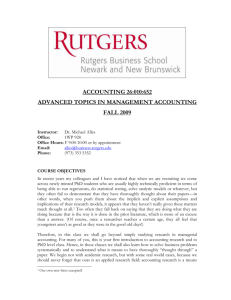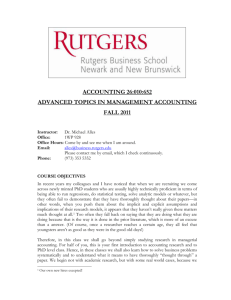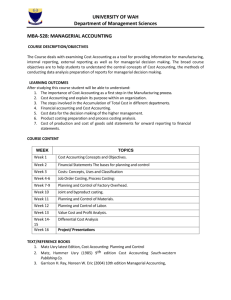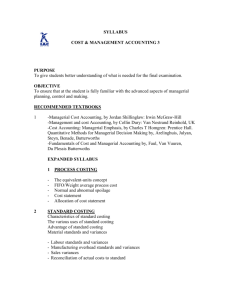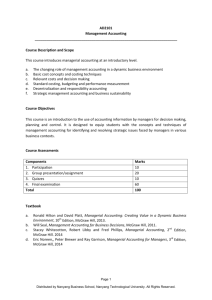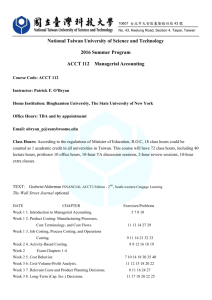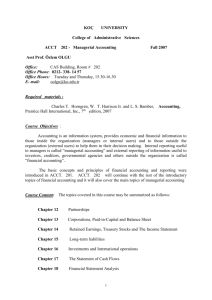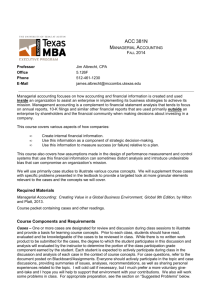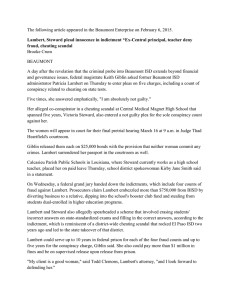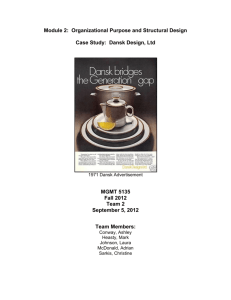NYU - Rutgers Business School
advertisement
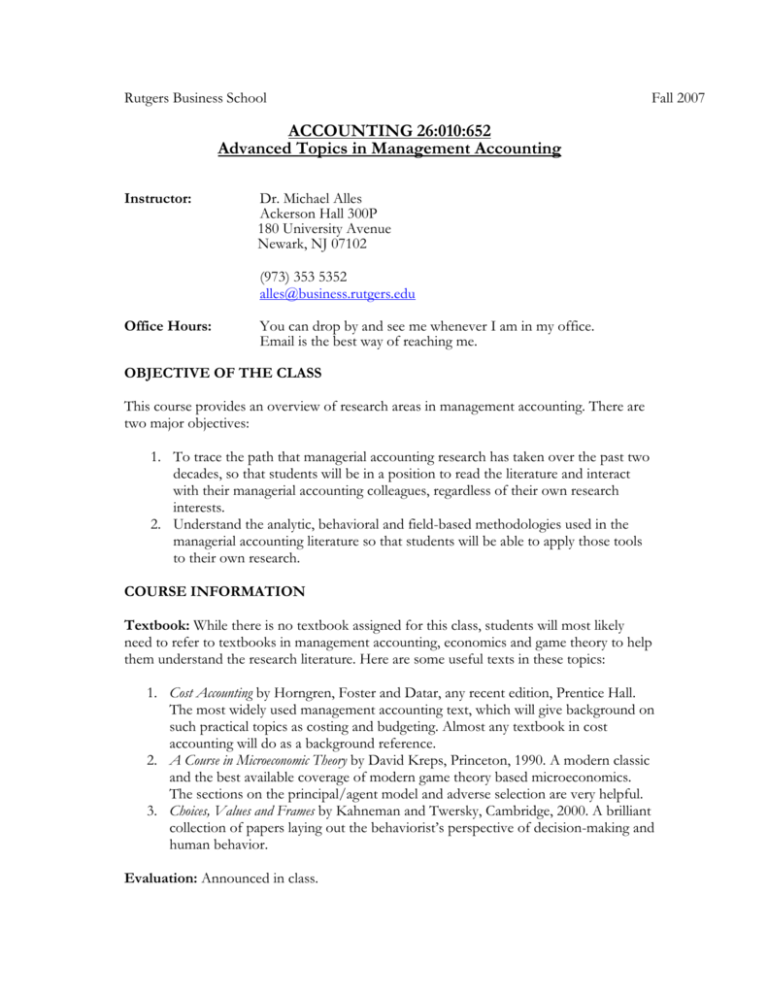
Rutgers Business School Fall 2007 ACCOUNTING 26:010:652 Advanced Topics in Management Accounting Instructor: Dr. Michael Alles Ackerson Hall 300P 180 University Avenue Newark, NJ 07102 (973) 353 5352 alles@business.rutgers.edu Office Hours: You can drop by and see me whenever I am in my office. Email is the best way of reaching me. OBJECTIVE OF THE CLASS This course provides an overview of research areas in management accounting. There are two major objectives: 1. To trace the path that managerial accounting research has taken over the past two decades, so that students will be in a position to read the literature and interact with their managerial accounting colleagues, regardless of their own research interests. 2. Understand the analytic, behavioral and field-based methodologies used in the managerial accounting literature so that students will be able to apply those tools to their own research. COURSE INFORMATION Textbook: While there is no textbook assigned for this class, students will most likely need to refer to textbooks in management accounting, economics and game theory to help them understand the research literature. Here are some useful texts in these topics: 1. Cost Accounting by Horngren, Foster and Datar, any recent edition, Prentice Hall. The most widely used management accounting text, which will give background on such practical topics as costing and budgeting. Almost any textbook in cost accounting will do as a background reference. 2. A Course in Microeconomic Theory by David Kreps, Princeton, 1990. A modern classic and the best available coverage of modern game theory based microeconomics. The sections on the principal/agent model and adverse selection are very helpful. 3. Choices, Values and Frames by Kahneman and Twersky, Cambridge, 2000. A brilliant collection of papers laying out the behaviorist’s perspective of decision-making and human behavior. Evaluation: Announced in class. Accounting 26:010:652 Advanced Topics in Management Accounting Rutgers Business School Course Schedule Session 1 Course Introduction Introduction to the course Course expectations Thinking Through a Business Problem Prepare: The Sharp Company The point of this exercise is to learn how to systematically think through a business problem, which is a skill needed not only in management, but also in research. This is one of my favorite cases, because while very short, it has many layers of complexity and subtlety. It makes you realize the need to have a systematic and rigorous method for analyzing management accounting problems. Please use the following steps when preparing this case: 1. Define the problem that management is facing. 2. What hypotheses are there for why this problem has arisen? Given those hypotheses, come up with possible solutions. Then explain which solution you will choose to adopt and why. 3. Discuss the pros and cons of the proposed change to the charging system for engineering time. Session 2 Overview of Costing, Pricing, Strategic Planning and Decision Making Prepare: A/S Dansk Minox. This is an extremely complex case, which is another favorite of mine because it brings together concepts in costing, operations, pricing, marketing and strategy all within an environment of considerable uncertainty. By itself Dansk Minox comprises a crash course in management accounting. Depending on how students deal with these two cases I will think about adding more sessions on basics of management accounting, such as Activity Based Costing, strategic control systems, the Balanced Scorecard and so forth. Please make sure that you analyze this case using the systematic approach that we learnt when we did the Sharp case. One of the central issues in this case is the definition of profitability: should it be defined in the short term or the long-term? How does this change the decision problem? Why does Dansk/Minox want to introduce this product in 2 the first place? Does their reasoning make sense to you? Please make sure that you have prepared numerical solutions to questions 1-5. Session 3 Introduction to Agency Theory Read: Lambert, R. Agency Research in Managerial Accounting. Journal of Accounting & Economics, Vol. 32, No. 1-3, December 200) Other Important Readings: 1. Holmstrom, B., Moral hazard and Observability, Bell Journal of Economics (1979) 10:74-91. 2. Antle, R., and J. S. Demski, The Controllability Principle in Responsibility Accounting, The Accounting Review (1988) 63:700-718. 3. Banker, R., and Datar, S. M., Sensitivity, Precision and Linear Aggregation of Signals for Performance Evaluation, Journal of Accounting Research (1989) 27:21-39. 4. Myerson, R., Incentive Compatibility and the Bargaining Problem, Econometrica (1979) 47:61-78. 5. Antle, R., and G. Eppen, Capital Rationing and Organizational Slack in Capital Budgeting, Management Science (1985) 31:163-74. 6. Holmstrom, B. and P. Milgrom, Multi-task Principal Agent Analysis: Incentive Contracts, Asset Ownership and Job Design, Journal of Labor Economics and Organization (1991) 6(Spring). 7. Cohen, S. L., S.M. Dater and R. Lambert, Balancing Performance Measures, Journal of Accounting Research (Forthcoming). 8. Demski, J. S. and D. E. M. Sappington, Optimal Incentive Contracts with Multiple Agents, Journal of Economic Theory (1984) 33:152-71. 9. Lambert, R., Executive Effort and the Selection of Risky Projects, Rand Journal of Economics (1986) 17:77-88. From this point on, I have not prepared a course outline, because as in past semesters, it is highly unlikely that such a plan would be followed. Instead, I shall play it by ear, adapting the course and adjusting its content and speed to the background, interests and needs of the students. I anticipate using the Lambert reading as a sort of textbook, working systematically through it and then referring to the original articles that he surveys. 3
